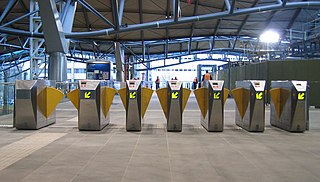 W
WAn automated fare collection (AFC) system is the collection of components that automate the ticketing system of a public transportation network - an automated version of manual fare collection. An AFC system is usually the basis for integrated ticketing.
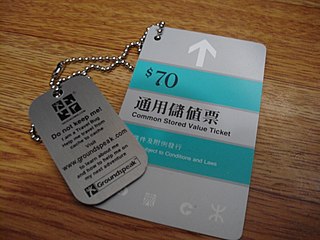 W
WA common stored value ticket was a plastic magnetically sensitive card used for paying fares on the MTR and KCR railway systems in Hong Kong from 1984 to 1999. It was also used on Citybus and Kowloon Motor Bus for some MTR and KCR feeder bus services. The system was replaced by the Octopus card system in 1997 and phased out on 2 January 1999. The MTR and KCR have continued to issue magnetic strip cards for single-journey and souvenir tickets.
 W
WThe Edmondson railway ticket was a system for recording the payment of railway fares and accounting for the revenue raised, introduced in the 1840s. It is named after its inventor, Thomas Edmondson, a trained cabinet maker, who became a station master on the Newcastle and Carlisle Railway in England. He introduced his system on the Manchester and Leeds Railway. Previously, railway companies had used handwritten tickets, as was the practice for stagecoaches, but it was laborious for a ticket clerk to write out a ticket for each passenger and long queues were common at busy stations. A faster means of issuing pre-printed tickets was needed. There was also a need to provide accountability by serial-numbering each ticket to prevent unscrupulous clerks from pocketing the fares, who now had to reconcile the takings against the serial numbers of the unsold tickets at the end of each day.
 W
WAn exit fare is a method of collecting ridership fees, or fares, from a transportation system, where the fee is collected from passengers upon reaching their destination.
 W
WThe EZ-Link card is a contactless smart card used for the payment of public transportation fares in Singapore.
 W
WThe TFI Leap Card is a contactless smart card for automated fare collection overseen by Transport for Ireland (TFI). It was introduced in the Greater Dublin area in 2011 for Luas, DART, Iarnród Éireann and Dublin Bus, but acceptance has significantly expanded. Initially, Leap Cards offered only a pre-paid electronic wallet system for single-trip fares; since May 2014, it has also been possible to load it with weekly, monthly and annual subscriptions. In September 2017, there were over 2.5 million Leap Card users according to the National Transport Authority. The Leap Card is the result of many years' work by the Railway Procurement Agency and the National Transport Authority as part of the rollout of an integrated ticketing scheme for public transport in Dublin city. Fares are generally discounted compared to cash prices, and limited integrated ticketing is offered via multi-trip discounts and daily fare caps. The minimum top-up for the card is currently €5.
 W
WManual fare collection is the practice of collecting fares manually. "Fare collection" generally refers to the collection of fares in the transport industry in return for a ticket or passes to travel. Commonly used on buses and train transport systems, manual fare collection is increasingly becoming obsolete with the introduction of smart cards such as the Transport for London 'Oyster card'. However, in the face of this trend, some companies have opted to retain more traditional methods of manual fare collection to both save money and ensure reliability. In the United Kingdom, examples of this can be seen on the Transport for London Heritage lines and the FirstGroup FTR routes in York, Leeds, Luton, and Swansea where bus conductors have returned to work. The other reason(with lowering prices of electronics, and in most cases need to buy it once) may be for Heritage routes - tradition "look", for other routes(because of quite high monthly labor cost in UK) agreements and strong unions with the tries from politics to lower the unemployment rate by making overworking in public service.
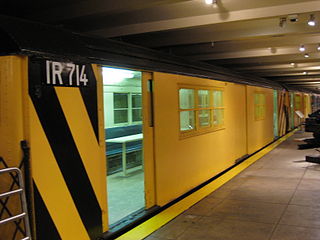 W
WA money train is one or more railcars used to collect fare collection revenue from stations on a subway system and return it to a central location for processing. This train is typically used to carry money bags guarded by transit police to deter robberies.
 W
WMore Card is a rechargeable smart card for paying transportation fares in public transport systems in India. Tipped as a nationwide interoperable transport card, the card aims to be a single point of transaction, applicable in state buses, Metro and even parking. The card was launched in 2012 in Delhi, initially acting as a common card for the Delhi Metro and its feeder buses.
 W
WMultivía is a contactless card designed for paying the travel fares in the mass transport system Transantiago, in Santiago, the capital of Chile. Tarjeta Bip! or Bip! Card is a plastic card equipped with a chip, that automatically discounts the cost of a travel when passing the card near a contactless card reader.
 W
WNational Common Mobility Card (NCMC), is an inter-operable transport card conceived by the Ministry of Housing and Urban Affairs of the Government of India. It was launched on 4 March 2019. The transport card enables the user to pay for travel, toll duties, retail shopping, and withdraw money.
 W
WThe Nol Card is an electronic ticketing card that was released in for all mode of public transport in Dubai services, on August 2009. The word Nol is an Arabic word نول for fare. The Nol Card system was developed by Hong Kong-based company Octopus Cards Limited..
 W
WRav-Kav is a reusable contactless stored value smart card for making electronic payments as a joint fare collection system for the different public transportation operators across Israel.
 W
WRed Bus was implemented in Mendoza, Argentina in August 2006, for the payment of the public transport. The system mixes payment by cash with a Mifare contactless smart card. The system was first implemented in the city of Córdoba, then in Mendoza and recently in the city of Salta.
 W
WRejsekort is an electronic ticket system for public transport in Denmark. The system is a collaborative work between DSB, HUR, Ørestadsselskabet, and various regional bus companies, and work on it started on August 18, 2003. In June 2005, the Thales Group and Accenture were chosen as suppliers.
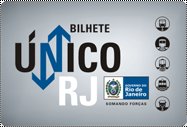 W
WThe RioCard is a smartcard system used in the transport system of Rio de Janeiro state, Brazil. The card is contactless and uses MIFARE technology. It is a form of electronic payment produced and distributed by the Fetranspor company, in cooperation with Itaú bank. Its installation was seen as strengthening Brazil's connection with the Open Standard for Public Transport (OSPT) Alliance.
 W
WA Setright Machine is a machine operated by a conductor or guard for issuing bus tickets from a blank paper roll. Not only does it print the ticket as a receipt for the passenger to retain as proof of payment, it also has mechanical counters driven internally by the mechanism to count the total amount of money represented by the series of tickets issued. If the user fills in a waybill showing the starting register readings and later the end of duty readings, the total sum of money to be paid to the bus owner is readily calculated. Another counter provides the total number of tickets issued which should be equal to the number of passengers who travelled.
 W
WIn numismatics, token coins or trade tokens are coin-like objects used instead of coins. The field of token coins is part of exonumia and token coins are token money. Tokens have a denomination either shown or implied by size, color or shape. "Tokens" are often made of cheaper metals: copper, pewter, aluminium, brass and tin were commonly used, while bakelite, leather, porcelain, and other less durable materials are also known.
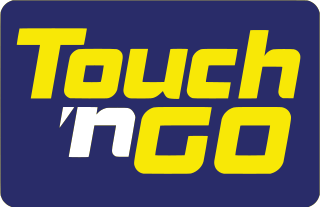 W
WThe Touch 'n Go smart card is used by Malaysian toll expressway and highway operators as the sole electronic payment system (EPS). The credit card-sized smart card is made of plastic with Philips' MIFARE Classic microchip technology embedded in it.
 W
WTouch 'n Go eWallet is a Malaysian digital wallet and online payment platform, established in Kuala Lumpur in July 2017 as a joint venture between Touch 'n Go and Ant Financial. It allows users to make payments in local stores via QR code, pay for toll roads and petroleum via RFID, pay bills and car parking, pay for purchases on e-commerce websites, taxi hailing mobile apps, food delivery, peer-to-peer banking, as well as book movie and airline tickets.
 W
WA train ticket is a ticket issued by a railway operator that enables the bearer to travel on the operator's network or a partner's network. Tickets can authorize the bearer to travel a set itinerary at a specific time, a set itinerary at any time, a set itinerary at multiple times, or an arbitrary itinerary at specific times. The last two categories are often called passes: the former is often sold as a discounted block of trips for commuters; the latter is often sold to vacationers, such as European Eurail passes.
 W
WThe Troika card is a contactless reusable card designed to pay for public transport in Moscow. It is the centrepiece of the new ticketing menu introduced in Moscow on April 2, 2013.
 W
WA turnstile is a form of gate which allows one person to pass at a time. It can also be made so as to enforce one-way human traffic, and in addition, it can restrict passage only to people who insert a coin, a ticket, a pass, or similar. Thus a turnstile can be used in the case of paid access, for example to access public transport, a pay toilet, or to restrict access to authorized people, for example in the lobby of an office building.
 W
WThe VEM is a Smart card system used in bus, train and metro of the metropolitan area of Recife, Brazil.
 W
WVix Technology (Vix) is a company that designs, supplies and operates automated fare collection (AFC) systems, intelligent transportation systems (ITS), access, payment and passenger information display systems (PIDS) for the public transit industry.